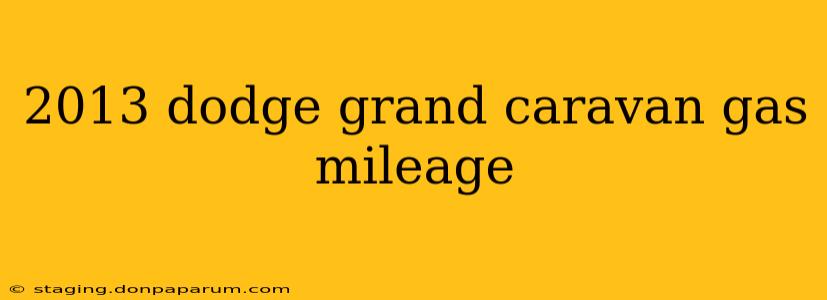The 2013 Dodge Grand Caravan, a popular minivan known for its spaciousness and family-friendly features, also boasts respectable fuel economy for its class. However, the exact gas mileage you achieve will depend on several factors. This guide delves into the specifics, helping you understand what influences your fuel efficiency and how to maximize it.
EPA Estimates vs. Real-World MPG
The Environmental Protection Agency (EPA) provides estimated fuel economy figures for all vehicles. For the 2013 Dodge Grand Caravan, these figures typically range from 17 mpg city and 25 mpg highway. It's crucial to remember that these are estimates under ideal testing conditions. Your actual gas mileage will likely differ based on various factors.
Factors Affecting Gas Mileage
Several factors can significantly impact your 2013 Dodge Grand Caravan's fuel economy:
Driving Habits:
- Aggressive Driving: Rapid acceleration, hard braking, and excessive speeding dramatically reduce fuel efficiency. Smooth, consistent driving is key.
- Consistent Speed: Maintaining a steady speed, especially on highways, improves gas mileage compared to frequent acceleration and deceleration.
- Traffic Conditions: Stop-and-go city driving significantly lowers MPG compared to highway driving.
- Idling: Minimize idling time. Turning off the engine when parked for extended periods saves fuel.
Vehicle Condition:
- Tire Pressure: Properly inflated tires are crucial. Under-inflated tires increase rolling resistance, reducing fuel efficiency. Check your tire pressure regularly and inflate them to the manufacturer's recommended pressure (found in your owner's manual or on a sticker inside the driver's side doorjamb).
- Regular Maintenance: Ensure your vehicle undergoes regular maintenance, including oil changes, filter replacements, and tune-ups. A well-maintained vehicle runs more efficiently.
- Vehicle Load: Carrying heavy loads reduces gas mileage. Lighten your load whenever possible.
- Aerodynamics: Roof racks, cargo carriers, and other exterior additions increase wind resistance, negatively impacting fuel economy.
Environmental Factors:
- Weather Conditions: Cold weather can slightly reduce fuel efficiency. Extreme temperatures (both hot and cold) can impact performance.
- Terrain: Driving uphill or in mountainous regions consumes more fuel than driving on flat terrain.
Maximizing Your 2013 Dodge Grand Caravan's Fuel Efficiency
To optimize your gas mileage:
- Drive Smoothly: Practice smooth acceleration and braking.
- Maintain Consistent Speed: Avoid rapid changes in speed.
- Use Cruise Control: On the highway, cruise control can help maintain a consistent speed and improve fuel economy.
- Keep Tires Inflated Properly: Regularly check and adjust your tire pressure.
- Regular Maintenance: Adhere to the recommended maintenance schedule.
- Reduce Weight: Remove unnecessary items from your vehicle.
- Plan Your Routes: Avoid congested areas and choose routes with less stop-and-go traffic.
Understanding Your Fuel Consumption
Keeping a fuel log can help you track your gas mileage and identify potential issues. Note your mileage at fill-ups, the amount of fuel purchased, and the driving conditions. This data can reveal trends and help you understand what factors most influence your fuel consumption.
By understanding the factors that affect fuel economy and implementing the tips outlined above, you can improve the gas mileage of your 2013 Dodge Grand Caravan and save money at the pump. Remember, consistent driving habits and regular maintenance play a significant role in maximizing fuel efficiency.

